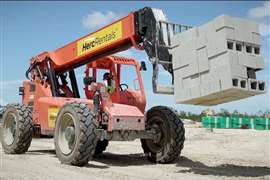How one company pioneered the access market in Chile
06 February 2023
Sandra Franco, the founder of Chile’s Alo Group, describes the access sector in the country and surrounding markets.
 Sandra Franco, founder, Alo Group. (PHOTO: Alo Group)
Sandra Franco, founder, Alo Group. (PHOTO: Alo Group)
As a pioneer of the access market in Chile Alo Group has remained at the forefront of it since the company’s formation almost 20 years ago.
Likewise, the company’s CEO Sandra Franco can also claim pioneer status.
History of Alo Group
She launched the specialist rental company at a time when powered access in the country had barely been heard of, and started it with less than 100 units working in the country.
“We began with very few units and started with rental, [rather than distribution],” Franco explains, “Rental was the easiest way to penetrate the market and let people know about aerials.”
In the beginning, Franco’s enterprise went under the name of PTA Platforma, and as she says the first months and years were a real challenge.
Back in 2002, before the formation of Alo Group, when those wishing to work at height needed equipment, they asked for a crane.
“They only knew about cranes and did not know the difference between lifting a weight and lifting a person to work at height.
“It was very difficult to change and their mindset.”
Before Alo started introducing equipment to Chile, the access market chiefly consisted of Genie lifts provided by the Caterpillar distributor Finning.
Now, says Franco, the market has changed completely, and offers a rental sector that is now as well-developed for aerials as it is for generalist equipment.
Business growth years: How IPAF changed Alo’s direction
In the process of expanding the specialist access market, the Alo team - which includes founders Sandra Franco and her husband and partner Alejandro Zenklussen - was constantly traveling around Chile and attending major international shows to expand their knowledge of the industry.
It was during this period that they discovered IPAF, which Franco explains was a turning point for the company.
“Meeting IPAF changed everything for us; we found the value proposition for our company - the target of providing a comprehensive service, based on safety.”
In 2005, the company became members of IPAF and sent four people to the UK to be trained as instructors.
Franco continues, “We sent them to Europe because there were no senior instructors in Latin America - then we opened the first IPAF training centre in the region.
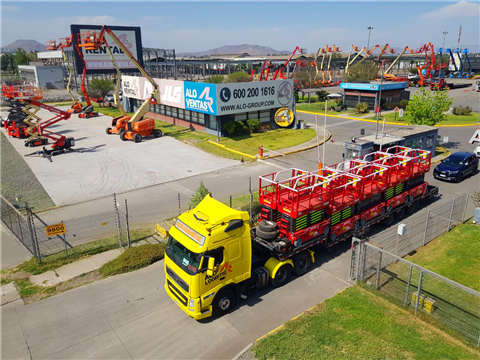 The Alo Group headquarters. (PHOTO: Alo Group)
The Alo Group headquarters. (PHOTO: Alo Group)
“This was very important because before that you just had the crane operators. The owners of those crane companies thought if someone can operate a crane they can operate a MEWP.
“But as they found out, it is completely different, and operators sometimes got into a panic when they found themselves working at height.”
During this period the company also significantly grew its sales team with all members gaining IPAF PAL Cards.
Following that, Franco was invited to join the IPAF Council. “At that time, I was not just the representative of a country but the whole of Latin America, and I had to explain the struggles and efforts involved in developing the market in these regions.”
In February 2010, Chile suffered a major earthquake and tsunami just off its coast, with a magnitude of 8.8, which devastated large parts of the country.
“We used to have a row of people at the front of our yard looking for equipment to do the reconstruction.”
Just a couple of months after the earthquake, in April, Alo Group won its first IAPA award for best IPAF marketing campaign, in this case across Latin America.
This was followed by a second in 2017, when the company took home the IAPA Powered Access Pioneer trophy.
Franco’s perseverance has paid off long-term too, resulting in Alo’s fleet size growing to more than 1,800 units today.
This is in comparison to the estimated total 5,000 units of access equipment operating across Chile today.
As Franco explains most of the other rental companies are small, with just a few units in their fleets.
Rental: Launching new equipment brands
Apart from the direct rental side of the business, Alo has been a JLG representative since it was established.
And, while the company still has many JLG units in its fleet, two years ago it launched its own MEWP brand – Alo Lift, which ties in with Chile’s national red football shirt colours.
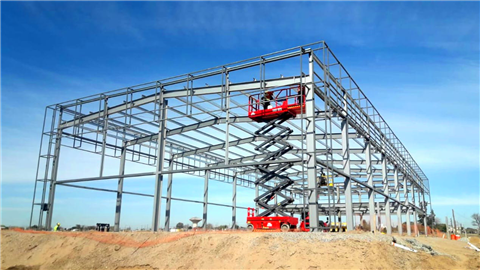 One of Alo Lift’s rough terrain scissor lifts. (PHOTO: Alo Group)
One of Alo Lift’s rough terrain scissor lifts. (PHOTO: Alo Group)
The product line covers the full range of lifts from low level access to booms, spiders and telehandlers.
It means the equipment that Alo now buys comes from a selected range of approved manufacturers across the world.
Under each separate arrangement, Alo effectively operates as a designer of its own equipment alongside the OEMs, which then produce the machines on Alo’s behalf and under its own brand name.
In the case of telehandlers, Alo has a partnership with Faresin, which supplies its equipment branded ‘Alo Lift – made by Faresin.’
While Franco declines to name the factories that it uses to produce its equipment, she confirms that they are all based in Europe and Asia.
Today, Alo also has seven branches the length of Chile, as well as bases in neighbouring countries Peru, Argentina, Colombia and Panama, with a particular focus on the latter.
“Panama will be the base to spread out into central America and countries to the north of Latin America,” Franco comments.
Latin America: equipment rental market conditions
Turning to market conditions, Franco believes there are difficult times ahead. The new governments in Chile, Colombia, Brazil and Peru are unlikely to be good for business.
High inflation is another challenge and one of the signs of a toughening economic environment.
Franco, who is originally from Argentina, says she is used to the inflationary pressures which her home country has suffered acutely from in previous decades.
Conditions have improved somewhat since those tough times both in Argentina and Chile, and Franco adds, “We had got accustomed to going along at a steady pace, but now things are changing again.
“From my perspective, and being from Argentina, we are used to dealing with inflation. And we know the right tools to use to tackle these difficulties.
“Maybe it will be harder for the younger generations that did not live through those inflationary times.”
Government and politics in South America
Looking at Argentina specifically, the country has a range of challenges in the way of growing access.
“The country wants to work with good technology, but the government is so protective that they have a lot of import barriers,” says Franco.
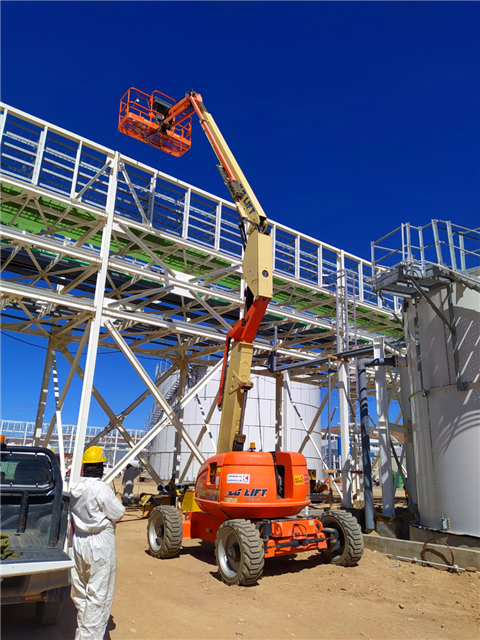 Alo Group has a longstanding partnership with JLG. (PHOTO: Alo Group)
Alo Group has a longstanding partnership with JLG. (PHOTO: Alo Group)
“Even if they do not produce a product in the country, you still have to go through a lot of paperwork when you are bringing in a new model, and then they will decide to accept it or not.
“It is sad to work in this way. Also, in Argentina, as well as inflation, you have the difficult exchange rate.”
Expanding on the issues across Alo’s chosen markets, Franco adds, “Mainly, I would say these new governments are not stable and it makes it difficult to plan for the future, when you do not have clear rules.
“That’s the main characteristic of the new leaders in countries like Colombia and Brazil because investment is not a priority - they just want to collect taxes.
“That is not easy for a company like us, as companies are fearful to invest and are waiting to see what happens, rather than investing.”
Despite the challenges Alo Lift has committed to offering new technology and replacing its fleet. The company has an average unit age of five years.
“This is important for us as you end up with less problems with customers and less people in your workshops, because you have less problems with your equipment.”
The Covid-19 pandemic in Chile
Alo was affected by the Covid pandemic as much of the world was. “We had two very difficult years and each country had their own rules, but in the majority of them there was around one year when people did not work.”
To tackle the situation in Chile, the government introduced a ‘hybrid’ working model in which there were different shifts in workshops, like those run by Alo, to allow maintenance of the machines.
Despite this and as in other parts of the world, the company did not see a drop in the rental market.
In fact, rental saw an upturn in the period and compensated for the lack of sales.
“People needed to keep things maintained and we had had no problems with the different segments of the industry.”
Supply chain challenges
Another and very current globally shared issue is the supply chain.
Franco says, “The supply chain was broken during the standstill of Covid, so I don’t see such a quick rebound. We have our own suppliers and we have a strong alliance with them and we try to help each other.
“But you speak to some suppliers and they give a lead time of a year. You can’t work with a lead time like that. I think they don’t want to sell because they are afraid.”
Franco believes that some manufacturers would prefer not to sell equipment at this time, because they do not know when they will realistically be able to deliver it or what the cost of components will be to them when they are able to produce it in the factory.
Labour shortages: Chilean employment market
Another issue is labour. Chile, again like other countries, is suffering a labour shortage.
One of the issues, Franco believes, is that some people do not want to work. “We don’t have enough people that want to work.
“They got used to being at home during the lockdown. Government paid for them to be at home and those benefits are still given today, so it’s easier for them to stay at home.”
Nevertheless, there are many opportunities in a region where the access sector is young and has the opportunity to grow.
Growth opportunities for equipment rental
“Colombia, Argentina and Panama are very young, although Panama not so. However, they are not so young in their way of working.”
Expanding on the matter Franco adds, “In these markets they already know what a MEWP is and they know they can do their work in less time, easily and safely by using one.
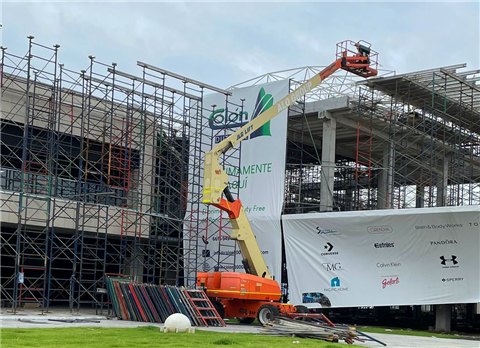 Alo Rental carrying out structural work. (PHOTO: Alo Group)
Alo Rental carrying out structural work. (PHOTO: Alo Group)
“While I think the conditions in these markets have to change to make it easier to work in them, there is work there in the future.”
Franco comments, “Colombia is a good example. We have a store in the free zone there and we can deliver directly to the customer, and it is a large country.
“I also see Panama as a small country but as a good distributor base for the countries in the rest of South America – like a hub.”
Looking at Chile, which is the region’s most mature access market outside of Brazil, Franco believes it can still grow considerably.
“To do that, we are always paying attention to innovation - the trend towards electric machines, to be more ecological and to waste less energy.
“I think that in Chile we will have a good door to enter new products, because the government and big industries like mining are introducing more demanding environmental policies.”





